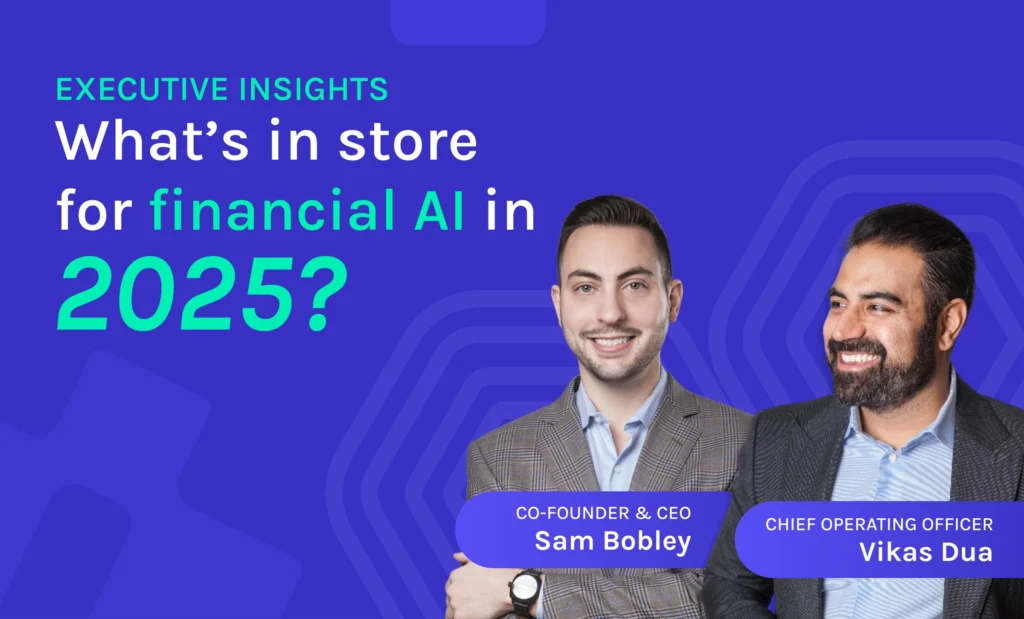Executive insights: What’s in store for financial AI in 2025?

AI is becoming increasingly adopted in financial services, with a broader range of solutions and a clearer understanding of where the technology can add value to workflows. Ocrolus has helped hundreds of customers in mortgage, small business, and consumer lending gain valuable efficiencies by automating document analysis.
As lenders continue to fine-tune their use of AI, we talked with Ocrolus CEO Sam Bobley and COO Vik Dua about their vision for the future of financial AI in 2025.
Two key trends stood out in mortgage and small business lending: finding a happy medium between automation and human expertise in mortgage AI implementation and rethinking the small business underwriting funnel to move AI-driven cash flow analytics earlier in the process.
Vik: Finding a balance between AI and human expertise in mortgage lending
Just a few years ago, mortgage underwriting processes were 100% manual. With the introduction of financial AI, some organizations have experimented with automating entire processes, with mixed success. In 2025, I expect lenders to accelerate the move into a more balanced approach to AI-assisted mortgage lending. There are some tasks that AI is very well suited for and others that require lending teams’ expertise.
Ultimately, the industry is learning where AI provides the greatest value. We’re at a point where AI can add efficiencies to nearly all of the document and income analysis involved in underwriting, and from there, lenders can tweak and adapt the loan to fit a particular borrower.
We see this as a balance in which lenders rely on AI for the heavy lifting of document classification and data calculations, freeing up underwriters and loan officers to spend more time on income nuances, approving more loans, and strengthening client relationships.
Whether it’s a data analyst on Ocrolus’ end or an underwriter on the lender’s side, the human in the loop provides necessary guardrails for AI-powered underwriting.

Sam: A new, cash flow-first approach to small business funding
Over the past year, we’ve helped dozens of partners reduce customer acquisition costs by using cash flow data earlier in the small business funding funnel – and we expect this trend to continue into 2025.
The value of cash flow data has always been evident. It gives funders a more complete picture of financial health than traditional data sources like credit checks alone. However, gathering and analyzing this data used to be too complex and costly to use at the top of the funnel.
Today, thanks to AI-powered document analysis, funders can reduce their reliance on credit bureau checks and instead leverage cash flow analysis to improve cost per decline and identify more high-quality borrowers. As open banking regulations take effect in the coming years, banking data and its valuable insights will only become more accessible, and thus, we expect more small business funders will rethink their underwriting processes and implement a cash flow-first funnel.

Companies across mortgage, small business and consumer lending have adopted AI to automate manual tasks and improve their decision-making workflows. To learn how Ocrolus can help your organization create a tailored financial AI solution for your business and start strong in 2025, book a demo today.
Key takeaways:
- The role of AI has grown in financial services as companies better understand the solutions available and use cases where they truly add value – a trend we expect to continue in 2025.
- In the mortgage industry, we expect a significant number of companies to adopt AI and hone in on the sweet spot between automation and human expertise.
- In small business funding, companies are already finding value in a cash flow-first approach to underwriting, and we expect more lenders to move cash flow above traditional credit bureau data in their decision-making funnel.


